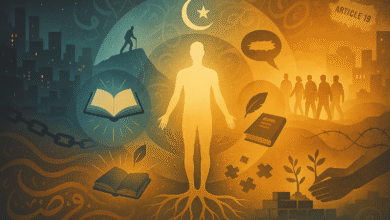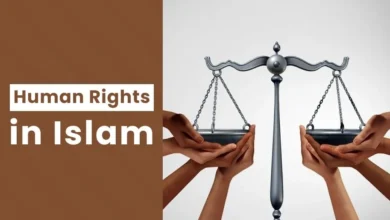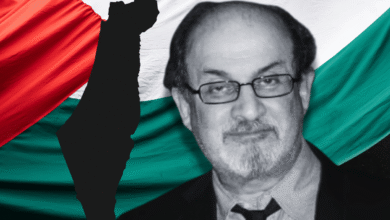Social Commitment In Islam

ISLAM is not merely a religion in the limited sense of the word where it is primarily considered a relation- ship between man and God. In Islam, religion is a dynamic commitment. It is commitment to Allah accepting Him as the Creator, the Master, the Law-giver, the Guide and the Sus- tainer of the universe. And, along with that, accepting the position of man as Allah’s deputy on the earth with the mission to establish justice among humans in all walks of life.
The prophetic mission as expounded in the Qur’an is that all prophets have been sent to communicate Allah’s guidance, teach His Book, purify morals, transform life and charac- ter for the sole purpose of establishing justice among the people. The commitment that Islam gives to man is a social and moral commitment to transform the world, to change the society and reshape the course of history. It is not merely a passive relationship between man and God confined to personal morals and places of worship. Instead, Islam has trans- formed the very concept of worship by emphasising that whole of human life is wor ship provided it is in the pursuit of right objec- tives; provided it is with full moral conscious- ness of the human situation and human obliga- tion. If prayer is a part of religious life; execu- tion of business, eradication of poverty, satis- faction of hunger, amelioration of disease are also part of the same religious activity. The Qur’an says: “Have you seen the person who denies Deen (the religion, the Day of Judge- ment). He is one who repulses the orphan (with harshness) and does not encourage the feeling of the indigent” (107:1-3).
Let us now see the more specific aspects. The concept of social security in Islam is based upon a very fundamental value which some- how and for whatever reasons, has been either neglected or even denied in the secular approach towards economy. And that is the concept of Rab (Rabubiyyah), that is there is a Lord of the universe Who created it with a pur- pose and that this universe is capable of pro- viding sustenance to mankind.
What is needed is right effort, proper and just distribution and effective organisation of society. Efficiency and growth are important but they have to go with equity and justice. In that framework all that is necessary for a dynamic and sustained growth of human soci- ety is very much there. What is needed is right- ful and proper effort with entrepreneurship, risk-taking, innovation, creativity, develop- ment of technology, harnessing and all that is hidden yet available and its proper organisa- tion, distribution and management.
In all activities of life, man is supposed to start with the confidence that Allah is “Raziq” (the Provider). He is providing resources. All man has to do is to discharge his part of duty, to harness the resources in the right manner and to share them in a way that is just and equita- ble. A Muslim’s premise and starting point is, therefore, very different from that of the secu- lar Westerner. With this conviction and under- standing, man’s approach becomes positive and not a negative one; not one based on frust- rations but on hope. And history bears witness to the fact that with proper efforts, unlimited resources are tapped provided one is sincere to harness them in the service of mankind.
In the given context, the first obligation and starting point for the social security in Islam is the concept that every individual living in soc- iety has a right of access to resources that Allah has endowed the earth with. And it is the duty of every individual to make himself or herself economically and socially productive.
Friday feature
Why is it that begging has been forbidden in Islam? Why is it that the Prophet (peace be upon him) has said “A person who is well off or who is able-bodied should not go for Zakat.” The basic idea is that he has to be productive. One is duty-bound to work hard and share in production of whatever his capabilities allow.
The family which is a divinely ordained first training institution for human beings, is the starting point of the Islamic social security sys- tem. The love and affection that parents can give to their children has no substitute. We may establish as many dormitories as we want, yet there cannot be a better alternative for the natural climate in which the family nurtures and develops its new generation and which enables the new-born to acquire the values, culture, arts, skills and crafts of the society.
There is yet another institution in Islam cal- led in history as aaqelah which was a tribe for- merly. However, Islam transforms the concept of tribe to a more rational organisation of soci- ety, beyond the family, with a distinct entity of
The Islamic social sys- tem is not merely for the left-outs and have-nots. It also takes care of those who are par- ticipating in the economic process and wants them to have an honourable wage and participation in society and its business. It is not merely a cash-nexus- relationship, as under- stood in the European and American tradi- tion.
its own and specific moral, political and eoc- nomic responsibility. The idea that if an unkown person comes to a village, the villa- gers should extend hospitality to him for three days; the fact that your neighbour is impor- tant, and that if any person suffers in a locality and others do not take care of him, they are not only morally but legally responsible for it; the fact that if a crime is committed in a society and the criminal cannot be identified then. whole of that locality is held responsible and to pay Diyat for that crime, are but various man- ifestations of aaqelah. It means that after the family there has to be another tier in an Islamic society with moral, social and even political repsonsibilities.
The Islamic concept of social security is not confined only to supporting the disabled, look, ing after the feeble or providing pension to aged persons. Here social security starts from the day a person is born. The Prophet (pbuh) has said: “If anyone of you has died and has left some property that belongs to his heirs, which will be inherited in accordance with the Islamic law. But if a person has died and he has been in debt which cannot be paid off from his legacy then I am responsible for it as the head of the state.” Thus, principally it is the respon- sibility of society to take care of the deceased’s debt.
Even Zakat is not merely to finance the people without accountability. Zakat is not only to support those who cannot help them selves but also to support those who can help themselves and society. Zakat’s function is therefore to make the individual economically productive in the society and not just to sur- vive. The classic case is that of Hazrat Umar. It is stated that he gave three camels to a person who had come to seek Zakat and when the objection was raised as to why three camels had been given to a person, his answer was: “I want to see that in future this person pays Zakat instead of seeking it.” That lays the foundation of Islamic concept of social sec- urity which is not just providing sustenance
…
3
but enabling a person to have an honourable and economically useful and productive life.
The very concept of necessities has been revolutionised by Islam. The three tiers that we find in Islamic jurisprudence can be described as follows. First, the basic neces- sities which had been described as needs for body, faith morality, honour and common par- lour, i.e. food, clothing and shelter. Then there is a very close second tier of necessities that relates to education, promotion of marriage, protection of family life, health and transport. These have been described as the ‘aids to necessities’.
Islam emphasises that return for labour has to be a just wage. One of the reasons for many deprivations and failures is the absence of the concept of a fair wage in the society. If wage is determined merely by the forces of supply and demand, the relative bargaining power of the employer and the employee not being equita- ble, a just wage may not be achieved. That is why Islam has given a certain value guidance for wage determination. Five principles of value have been emphasised in this regard: The first and foremost is productivity. This is the starting point. Wages and rewards should be related to the contribution that the labourer makes. Second, determination of wages and rewards should also take into con- sideration the expertise and specialisation, physical as well as intellectual. Third aspect is need. While productivity, expertise and capac- ity to excel have been fully taken into account, the dimension of the need of a person, his fam- ily and his immediate dependents form an integral part of Islamic scheme for wage deter- mination. Fourth, not merely the technical expertise but also the moral qualities, trustworthines, dutifulness and honesty of the person should also be taken into account. Finally, the element of sharing the overall fruits of the productive effort, which is not tied to any of these forms.
The Islamic social system is not merely for the left-outs and have-nots. It also takes care of those who are participating in the economic process and wants them to have an honourable wage and participation in society and its busi- ness. It is not merely a cash-nexus-relation-
ship, as understood in the European and
American tradition. It is a much more delicate and comprehensive relationship where both the employer and the employee are part of a family and project. They have to share the wor- ries and duties as well as the return.
Finally, we have the system where those who suffer some incapacity and are faced with a special situation are properly looked after. Here again the Islamic system is unique. because this looking-after starts from the fam- ily. The principle of stewardship and guardian- ship is very important. It is the responsibility of the family to look after the interests of its members to the possible extent.





